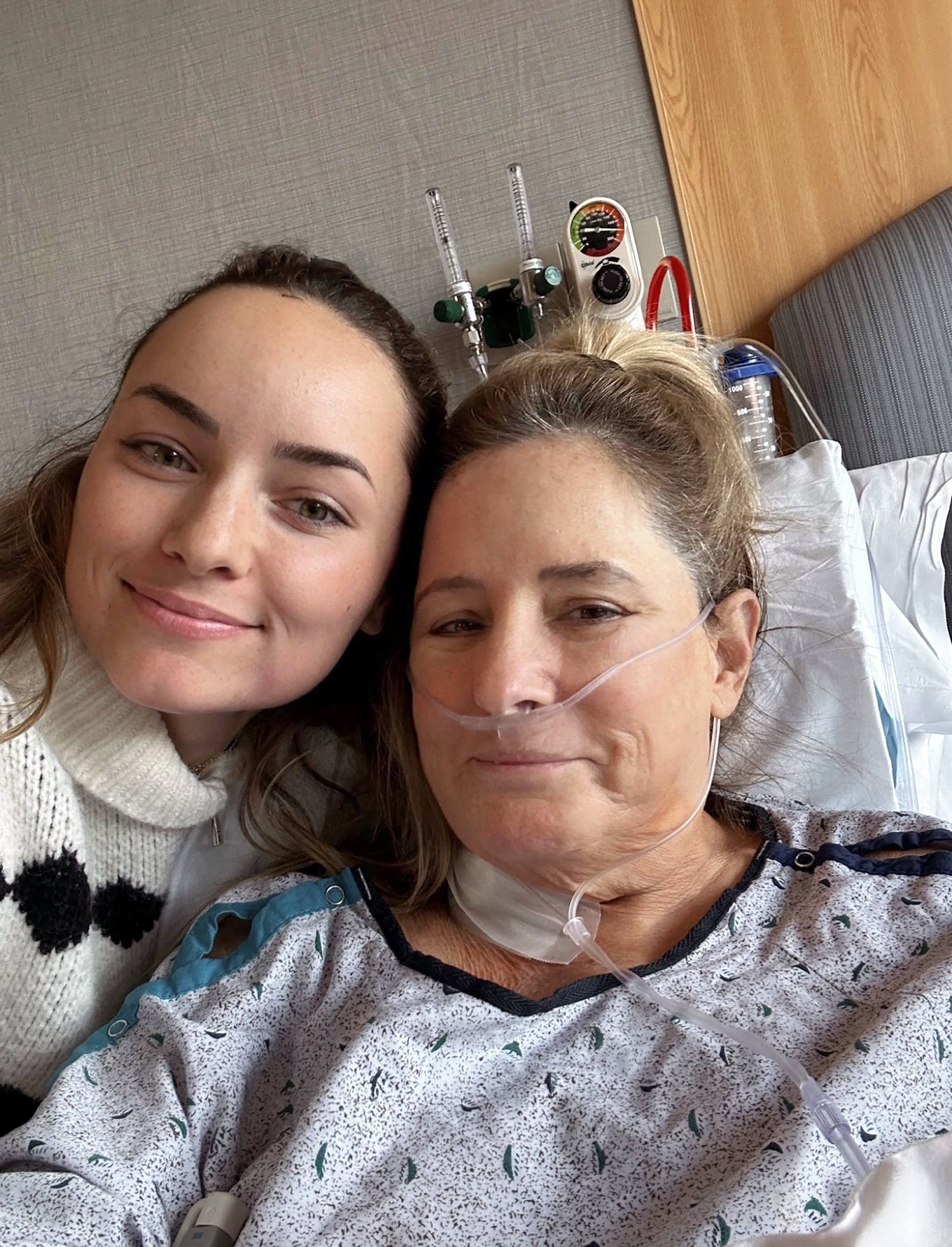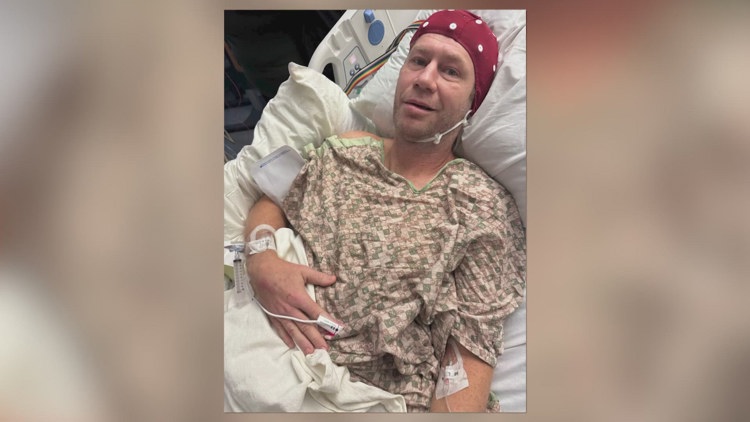
When Chris Kirmsse couldn’t complete a nuclear stress test this fall because her blood pressure was too high, she had to monitor it at home. Her daughter, Christine Kirmsse, a travel nurse, called to check on how her mom was doing and asked about her blood pressure. Christine Kirmsse was shocked to learn her mom’s blood pressure was — 200/100.
“She’s like, ‘I don’t like that. I want you to go to the ER,’” Chris Kirmsse, 60, of Morristown, New Jersey, tells TODAY.com.

“I’m like, ‘I feel fine. I don’t want to go. It’s going to calm down.
’” After more encouragement and recruiting her father’s help, Christine Kirmsse finally cajoled Chris Kirmsse into going to the ER, where doctors realized Chris Kirmsse needed immediate intervention. Her daughter’s encouragement likely saved her from a devastating health emergency, such as a stroke or . “She had been having some issue with her blood pressure,” Christine Kirmsse, 26, of Los Angeles, tells TODAY.
com. “When she said she had a headache, (I knew) that could be a sign of a stroke.” Over the summer, Chris Kirmsse underwent tests with her doctor, which determined that her cholesterol levels were “a little bit higher.
” To help, her doctor prescribed a statin to manage her cholesterol. Her doctor also ordered a calcium score test, a type of CT scan of the coronary arteries, to determine the amount of calcium in the arteries, according to . “I had a 369 calcium score, and my girlfriend nearly fell off her chair,” Chris Kirmsse recalls.
“She says, ‘Do you have a cardiologist?’” A calcium score between 100 and 400 indicates a “moderate” chance of heart attack, the Cleveland Clinic notes. So, Chris Kirmsse made an appointment with a cardiologist and that doctor adjusted some of her medications and ordered more tests, including a nuclear stress test. But Chris Kirmsse couldn’t complete the test.
Her blood pressure was too high to even get on the treadmill, she explains. The doctor gave her an injectable medication to try to see what was happening with her heart, but she developed a headache. “They said, ‘Well, your blood pressure is high, that’s why you have a headache,’” Chris Kirmsse says.
“Over the weekend, I was just checking my blood pressure.” When Christine Kirmsse called on Oct. 22 and heard how high her mom’s blood pressure was, she insisted that her mom go to the emergency room.
Chris Kirmsse didn’t want to go but eventually relented, hoping that she might have to get a stent to open an artery. When she arrived at the emergency room, staff ran a variety of tests, including a blood test that showed that she had troponin in her blood, which indicates someone had a heart attack, says the . That means Chris Kirmsee likely had a small heart attack earlier.
Doctors performed a cardiac catheterization, when doctors feed a tube through a blood vessel to the heart, on her and discovered something worrisome. “Her right coronary artery was completely blocked and ..
. her (left anterior descending artery) and her circumflex artery were like 70% blocked,” Christine Kirmsse says. “You’re not a candidate for a stent then.
Your only option is open heart surgery.” Chris Kirmsse was stunned. “I didn’t think I was going to be at the ER that long,” Chris Kirmsse says.
“And 15 hours later, I’m getting a cardiac catheter, and a couple (of) days later, open heart surgery.” On Oct. 29, Chris Kirmsse underwent triple bypass surgery to replace the blocked arteries.
Recovery has been tough at times. “I’m very badly bruised right here in my chest, and I have to watch what I do sometimes because I forget,” she says. “The worst of it is over.
It was the first week and a half that was really tough.” Still, the family feels lucky that doctors could intervene before Chris Kirmsse experienced a more serious health emergency. “We’re just so grateful,” Christine Kirmsse says.
The family has nicknamed Christine Kirmsse “the warden” because they all listen to her when she lays down the law about their health. Christine Kirmsse says “This isn’t the first time” she has helped her mom avoid serious health problems. When Chris Kirmsee had COVID-19, her oxygen levels dropped low enough that Christine Kirmsee sent her to the emergency room.
It was a good thing because Chris Kirmsse had developed pneumonia and needed to be treated. “(I do) whatever the warden says,” Chris Kirmsse says with a laugh. Chris Kirmsse plans on following a heart-healthy diet and lowering her sodium intake.
She was always active, taking boot camp classes, running marathons and lifting weights, and she hopes to continue some activity after finishing cardiac rehabilitation. In hindsight, Christine Kirmsse recalls that her mom was struggling. “(She was) short of breath,” Christine Kirmsse says.
“(She) did have signs. But either (she) ignored them or thought that they were normal for (her) age.” Chris Kirmsse agrees.
“I was telling you, ‘Why do I feel so foggy when I think,’” she says. “I am so clear-headed now.” That’s because Chris Kirmsse is “actually getting oxygen to (her) head,” Christine Kirmsse notes.
The blocked arteries also made it harder for Chris Kirmsse to even go up and down the stairs. “All of (her) arteries were clogged so the demand on (her) heart was a lot more,” Christine Kirmsse says. “Now (she'll) probably feel like a whole new person.
” Chris Kirmsse learned her coronary artery disease is hereditary, which made some of the deaths in her family make more sense. The mother and daughter hope Chris Kirmsse's story encourages people to learn more about heart disease. “We think it’s crazy (that this happened) but it’s really not because heart disease is the leading cause of death,” Christine Kirmsse says.
Chris Kirmsse plans on making herself “more of a priority” and hopes that others do the same and seek help if they notice something wrong with their health. “Be aware of what your body is telling you. Don’t dismiss it like I did.
Don’t think, ‘Oh it’s because you’re 60,’” she says. “Just go to the doctor and get checked out.” Meghan Holohan is a digital health reporter for TODAY.
com and covers patient-centered stories, women’s health, disability and rare diseases..















